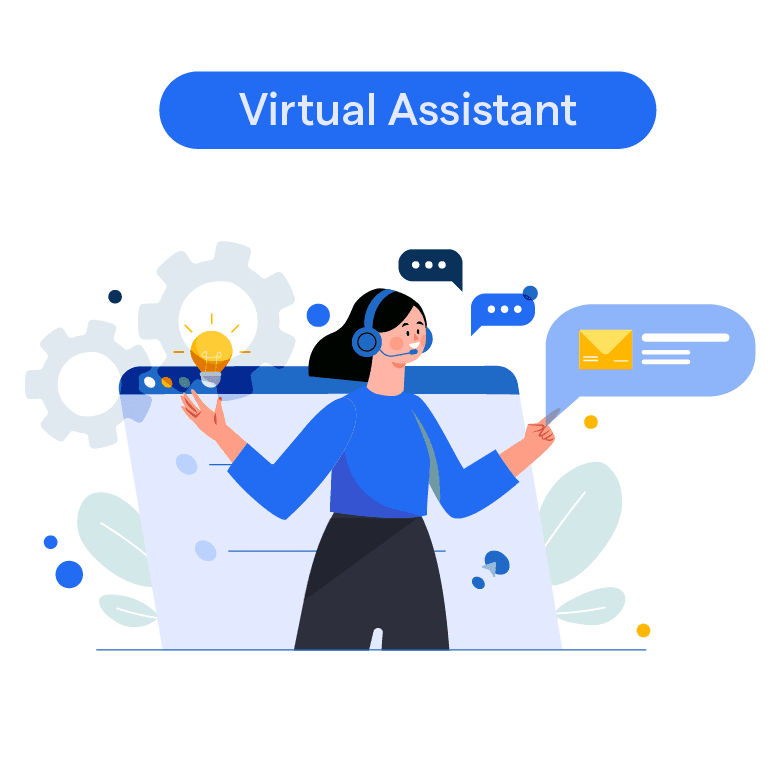Virtual Assistant
A virtual assistant is an AI-powered or human-based service that assists individuals or businesses in completing various tasks remotely. Virtual assistants can perform a wide range of administrative, creative, and technical tasks, helping users save time and increase productivity.
Importance of Virtual Assistants in Today's World

Virtual assistants have become increasingly important in today's fast-paced world due to several reasons. They offer convenience, efficiency, and cost-effectiveness. Whether it's managing personal tasks or supporting business operations, virtual assistants can handle diverse responsibilities, allowing users to focus on more critical aspects of their lives and work.
Types of Virtual Assistants
Personal Virtual Assistants
Personal virtual assistants are designed to assist individuals in managing their personal tasks and activities. They can handle a variety of tasks, such as scheduling appointments, setting reminders, making reservations, organizing travel plans, providing information, and even offering entertainment suggestions.
Examples of Personal Virtual Assistant Applications
Popular personal virtual assistants include Amazon's Alexa, Apple's Siri, Google Assistant, and Microsoft's Cortana. These virtual assistants are integrated into smart devices like smartphones, smart speakers, and smartwatches, allowing users to interact with them through voice commands or text inputs.
Business Virtual Assistants
Business virtual assistants are specifically tailored to support businesses and entrepreneurs in various operational areas. They can handle administrative tasks, customer support, data management, social media management, content creation, research, and more.
Examples of Business Virtual Assistant Applications
Business-oriented virtual assistants include tools like Trello for project management, Slack for team communication, HubSpot for customer relationship management, and Mailchimp for email marketing. These platforms provide virtual assistant-like functionality to streamline business processes and improve overall efficiency.
The 5W's of Virtual Assistants

Who Can Benefit from Virtual Assistants?
Individuals: Virtual assistants can help individuals manage their daily schedules, stay organized, and access information quickly.
Small Business Owners: Virtual assistants can assist small business owners in handling administrative tasks, customer support, and social media management, enabling them to focus on core business activities.
Entrepreneurs: Virtual assistants can support entrepreneurs and solopreneurs by taking care of repetitive tasks, research, and providing valuable insights, allowing them to allocate time to strategic planning and business growth.
Large Corporations: Virtual assistants can be employed by large corporations to streamline operations, enhance customer support, manage data, and improve overall productivity.
What Tasks Can Virtual Assistants Perform?
Virtual assistants can perform a wide range of tasks, including:
Administrative Tasks: Managing emails, scheduling appointments, organizing calendars, and handling documentation.
Customer Support: Providing assistance to customers, answering queries, and resolving issues.
Data Entry and Management: Handling data entry tasks, organizing databases, and managing information.
Social Media Management: Creating and scheduling social media posts, engaging with followers, and analyzing performance metrics.
Content Creation and Editing: Writing blog posts, articles, or newsletters, editing, and proofreading content, and optimizing for SEO.
Research and Analysis: Conduct market research, competitor analysis, and gathering information on specific topics.
Appointment Scheduling and Calendar Management: Managing appointments, setting reminders, and synchronizing calendars.
Travel Planning and Booking: Researching travel options, booking flights, hotels, and arranging itineraries.
When to Hire a Virtual Assistant?
Increasing Workload: If your workload is becoming overwhelming and affecting your productivity, it's a good time to consider hiring a virtual assistant.
Need for Specialized Skills: When you require specialized skills for certain tasks but don't have the expertise in-house, a virtual assistant can fill the gap.
Time Management Challenges: If you find it difficult to manage your time effectively and juggle multiple responsibilities, a virtual assistant can help alleviate the burden.
Cost-Effectiveness: Hiring a virtual assistant can be cost-effective compared to hiring a full-time employee, especially for small businesses or individuals with limited budgets.
Where to Find Virtual Assistants?
Virtual Assistant Agencies: Many agencies specialize in providing virtual assistant services, offering a pool of pre-screened and trained professionals.
Freelance Platforms: Websites like Upwork, Freelancer, and Fiverr allow you to browse through profiles of freelancers offering virtual assistant services and hire based on specific requirements.
Online Communities and Forums: Engaging with online communities, professional forums, and social media groups can help you connect with virtual assistants who offer their services independently.
Why Use Virtual Assistants?
Improved Productivity and Efficiency: Virtual assistants can handle time-consuming tasks, freeing up your time to focus on high-priority activities and increasing overall productivity.
Cost Savings: Hiring virtual assistants can be more cost-effective than hiring full-time employees, as you only pay for the hours worked or specific tasks performed.
Access to Specialized Skills: Virtual assistants often possess expertise in various fields, providing you with access to specialized skills without the need for additional training or hiring.
Flexibility and Scalability: Virtual assistants offer flexibility in terms of working hours and can adapt to changing workloads, allowing you to scale up or down as needed.
How to Hire and Manage Virtual Assistants
Before hiring a virtual assistant, clearly define the tasks you need assistance with, establish your expectations, and outline the skills and qualifications required.
Conducting a Hiring Process: Screen potential virtual assistants based on their experience, skills, and references. Conduct interviews or trial tasks to assess their suitability for your specific needs.
Setting Clear Communication Channels: Establish effective communication channels such as email, messaging platforms, or project management tools to ensure smooth and timely collaboration.
Establishing Work Guidelines and Policies: Define guidelines, deadlines, and policies to ensure a clear understanding of work expectations, confidentiality, data security, and intellectual property rights.
Providing Feedback and Performance Evaluation: Regularly provide feedback and conduct performance evaluations to address any issues, encourage improvement, and maintain a positive working relationship.
Challenges & Best Practices for Virtual Assistant Management

Language and Cultural Differences
Ensure effective communication by being mindful of language barriers and cultural differences. Encourage open dialogue and promote cultural sensitivity to foster a harmonious working relationship.
Time Zone Challenges
If working across different time zones, establish clear communication protocols and plan for overlapping working hours to minimize delays and maximize collaboration.
Data Security and Confidentiality
Implement robust data security measures, including the use of secure communication channels, confidentiality agreements, and access controls, to protect sensitive information.
Tips for Effective Virtual Assistant Management
- Clearly communicate expectations, priorities, and deadlines.
- Provide comprehensive onboarding and training materials.
- Foster regular communication and establish a rapport.
- Use project management tools to track progress and collaborate effectively.
- Encourage open feedback and address any concerns promptly.
- Future Trends in Virtual Assistant Technology
Artificial Intelligence and Machine Learning
Advancements in AI and machine learning will enhance virtual assistants' capabilities, enabling them to better understand user needs, automate complex tasks, and provide more personalized and intelligent assistance.
Voice-Activated Virtual Assistants
Voice-activated virtual assistants will continue to evolve, becoming more accurate and natural in understanding and responding to voice commands, further enhancing user convenience and accessibility.
Integration with Internet of Things (IoT) Devices
Virtual assistants will increasingly integrate with IoT devices, enabling voice-controlled automation of smart homes, offices, and connected devices, creating a seamless and efficient user experience.
Virtual Reality and Augmented Reality Assistants
As Virtual Reality (VR) and Augmented Reality (AR) technologies advance, virtual assistants may expand into immersive environments, providing interactive and visually enhanced assistance, such as guiding users through virtual training or offering real-time information overlays.

Frequently Asked Questions
What are virtual assistants?
Virtual assistants are AI-powered software or devices that perform tasks and answer questions through voice or text-based interactions, enhancing productivity and user experience.
How do virtual assistants benefit businesses?
Virtual assistants automate routine tasks, provide instant support, reduce costs, and improve customer satisfaction by offering quick and accurate responses.
Can virtual assistants understand natural language?
Yes, virtual assistants use natural language processing (NLP) to understand and interpret user inputs, enabling more conversational and intuitive interactions.
How can virtual assistants be customized?
Virtual assistants can be tailored to specific industries, tasks, and use cases by training them on relevant data and integrating them with relevant systems.
Are virtual assistants secure and private?
Modern virtual assistants incorporate security measures like data encryption and user authentication to protect user data and ensure privacy.


